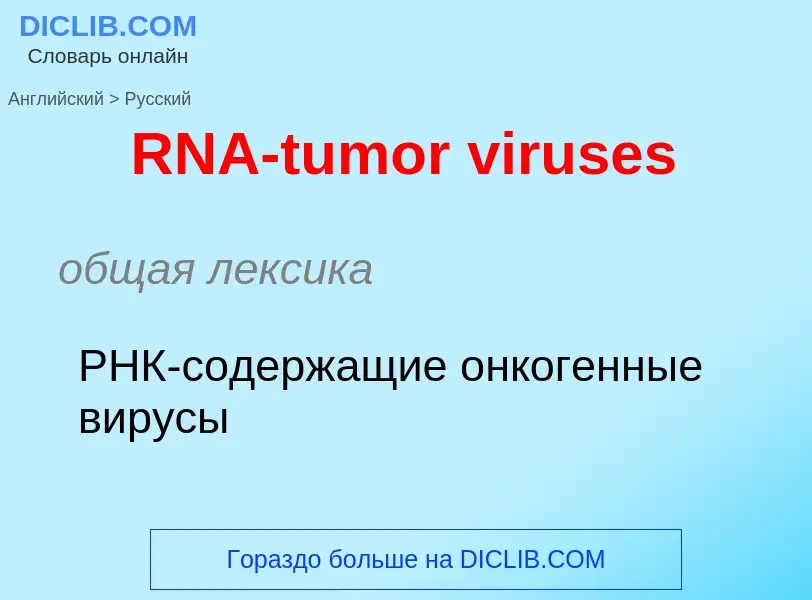Übersetzung und Analyse von Wörtern durch künstliche Intelligenz ChatGPT
Auf dieser Seite erhalten Sie eine detaillierte Analyse eines Wortes oder einer Phrase mithilfe der besten heute verfügbaren Technologie der künstlichen Intelligenz:
- wie das Wort verwendet wird
- Häufigkeit der Nutzung
- es wird häufiger in mündlicher oder schriftlicher Rede verwendet
- Wortübersetzungsoptionen
- Anwendungsbeispiele (mehrere Phrasen mit Übersetzung)
- Etymologie
RNA-tumor viruses - Übersetzung nach russisch
общая лексика
РНК-содержащие онкогенные вирусы
[ɔŋkəuɑ:ren'ei'vai(ə)rəs]
общая лексика
онкорнавирус
существительное
биология
онкорнавирус
ретровирус
общая лексика
онкогенный вирус
Wikipedia
A satellite is a subviral agent that depends on the coinfection of a host cell with a helper virus for its replication. Satellites can be divided into two major classes: satellite viruses and satellite nucleic acids. Satellite viruses, which are most commonly associated with plants, are also found in mammals, arthropods, and bacteria. They encode structural proteins to enclose their genetic material, which are therefore distinct from the structural proteins of their helper viruses. Satellite nucleic acids, in contrast, do not encode their own structural proteins, but instead are encapsulated by proteins encoded by their helper viruses. The genomes of satellites range upward from 359 nucleotides in length for satellite tobacco ringspot virus RNA (STobRV).
Most viruses have the capability to use host enzymes or their own replication machinery to independently replicate their own viral RNA. Satellites, in contrast, are completely dependent on a helper virus for replication. The symbiotic relationship between a satellite and a helper virus to catalyze the replication of a satellite genome is also dependent on the host to provide components like replicases to carry out replication.
A satellite virus of mamavirus that inhibits the replication of its host has been termed a virophage. However, the usage of this term remains controversial due to the lack of fundamental differences between virophages and classical satellite viruses.


![Michael Houghton]] and [[Charles M. Rice]] leading to the discovery of HCV as the causative agent of non-A, non-B hepatitis. Michael Houghton]] and [[Charles M. Rice]] leading to the discovery of HCV as the causative agent of non-A, non-B hepatitis.](https://commons.wikimedia.org/wiki/Special:FilePath/15 Hegasy Nobel Prize 2020 HepC.jpg?width=200)

![A [[micrograph]] showing cells with abnormal p53 expression (brown) in a brain tumor. A [[micrograph]] showing cells with abnormal p53 expression (brown) in a brain tumor.](https://commons.wikimedia.org/wiki/Special:FilePath/Anaplastic astrocytoma - p53 - very high mag.jpg?width=200)
![The structure of the [[hepatitis B]] virus The structure of the [[hepatitis B]] virus](https://commons.wikimedia.org/wiki/Special:FilePath/HBV.png?width=200)
![[[Kaposi's sarcoma]] is a cancer that can form masses in the skin and is caused by the [[Kaposi's sarcoma-associated herpesvirus]] (KSHV), also called HHV-8. [[Kaposi's sarcoma]] is a cancer that can form masses in the skin and is caused by the [[Kaposi's sarcoma-associated herpesvirus]] (KSHV), also called HHV-8.](https://commons.wikimedia.org/wiki/Special:FilePath/Kaposis sarcoma 01.jpg?width=200)
![Illustration of how a normal cell is converted to a cancer cell, when an [[oncogene]] becomes activated. Illustration of how a normal cell is converted to a cancer cell, when an [[oncogene]] becomes activated.](https://commons.wikimedia.org/wiki/Special:FilePath/Oncogenes illustration.jpg?width=200)
![Rabbit with [[Shope papilloma virus]] infection. Rabbit with [[Shope papilloma virus]] infection.](https://commons.wikimedia.org/wiki/Special:FilePath/Rabbit shopes papilloma virus 3.jpg?width=200)
